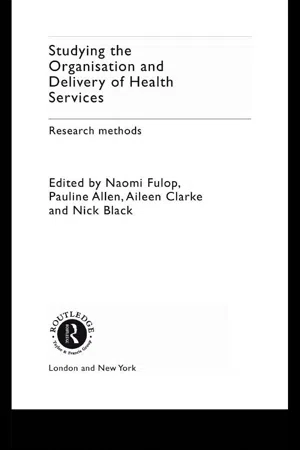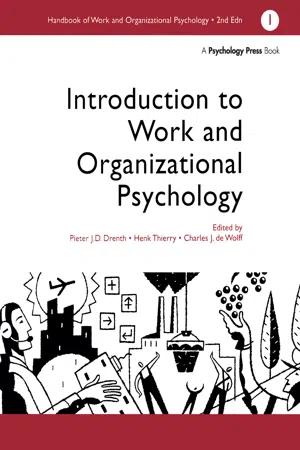Psychology
Organizational Psychology
Organizational psychology focuses on understanding human behavior in the workplace and applying psychological principles to improve organizational effectiveness. It encompasses areas such as employee motivation, leadership, team dynamics, and organizational culture. By studying individual and group behavior within the context of work, organizational psychologists aim to enhance productivity, job satisfaction, and overall well-being in the workplace.
Written by Perlego with AI-assistance
Related key terms
11 Key excerpts on "Organizational Psychology"
- eBook - ePub
- Carrie A. Bulger, Duane P. Schultz, Sydney Ellen Schultz(Authors)
- 2020(Publication Date)
- Routledge(Publisher)
Part IIIOrganizational Psychology
Organizational Psychology focuses on the social and psychological climate at work. Few people work alone. Most of us work in groups, such as a crew on an assembly line or the staff of a department in a corporate office. We develop informal cliques that generate and reinforce standards, values, and attitudes that may differ from those of the organization. We are also influenced by the formal structure of the company that employs us. Like informal groups, these formal groups generate a psychological climate or culture of ideals and ideas that affect our feelings about our job. Thus, our attitudes and behaviors in the workplace are influenced by the social climate of the organization and the psychological characteristics of its members. Organizational psychologists study the relationships between these two sets of factors.Leadership (Chapter 8 ) is a major influence on work attitudes and behaviors. Organizational psychologists study the impact of various leadership styles and the characteristics and responsibilities of leaders.Motivation, job satisfaction, and job involvement (Chapter 9 ) relate to employee needs and the ways organizations can satisfy them. Employees identify with a job and with organizational goals, and the nature of this identification affects job performance and satisfaction.Formal and informal groups and their psychological climate define the organization of an organization (Chapter 10 ). Organizational style involves factors such as participatory democracy, adaptation to social and technological change, socialization of new employees, and efforts to improve the quality of working life.Organizational Psychology affects your working career directly. It influences your motivations, the style of leadership under which you function best, the leadership qualities you may display, and the structure of the organization for which you work. These factors determine the quality of your work experience, which, in turn, influences your general satisfaction with life. - eBook - ePub
Psychology in Organizations
integrating Science and Practice
- Kevin R. Murphy, Frank E. Saal(Authors)
- 2013(Publication Date)
- Psychology Press(Publisher)
III SCIENCE AND PRACTICE IN Organizational PsychologyThis section focuses on the second major subdiscipline of I/O psychology, often referred to simply as Organizational Psychology. Unlike personnel psychology, which relies on specific, human resources procedures and techniques and is still relatively devoid of theory, Organizational Psychology encompasses topics that are broader, more abstract, and (so far, at least) more amenable to theoretical development. In addition to such obviously relevant topics as organizational design, change and theory, Organizational Psychology addresses work motivation and satisfaction, job involvement, organizational commitment, and leadership. This subfield of I/O psychology also concerns itself with issues that pertain to the psychological environments that characterize organizations—their climates and cultures. Because of its pervasiveness and enormous potential to affect workers’ behaviors, the psychological environment within organizations is the common thread that connects the four chapters in this section.In Chapter 9 , Walt Freytag takes a detailed look at the construct we now label “organizational culture,” paying particular attention to how such culture evolves, the nature and some of the manifestations of its content, and some of the strategies for assessing the culture of an organization. In Chapter 10 , Robert Baron examines a phenomenon that can influence and be influenced by an organization’s culture—organizational conflict—and focuses on the major causes of and some of the dominant strategies for managing this challenging organizational phenomenon. Chapter 11 deals with another issue that almost certainly has a reciprocal relationship with organizational culture and climate—sexual harassment; Frank Saal’s program of research suggests that interpersonal misperceptions may play an important role in some of the more common forms of sexual harassment in organizations. Finally, Chapter 12 - eBook - ePub
Frameworks for Practice in Educational Psychology, Second Edition
A Textbook for Trainees and Practitioners
- Barbara Kelly, Lisa Marks Woolfson, James Boyle(Authors)
- 2016(Publication Date)
- Jessica Kingsley Publishers(Publisher)
The specialty of industrial-Organizational Psychology (also called I/O psychology) is characterized by the scientific study of human behavior in organizations and the work place. The specialty focuses on deriving principles of individual, group and organizational behavior and applying this knowledge to the solution of problems at work. (APA 2016)It is significant to note that within the United States the field is referred to as industrial organisational psychology. Within the United Kingdom there are several terms used to describe the field, which include ‘organisational psychology’ and ‘work psychology’. The term chosen by the British Psychological Society (BPS) is ‘occupational psychology’. The BPS definition again has many similarities to the APA definition, and it states: ‘Occupational psychology is concerned with the performance of people at work and with how individuals, small groups and organisations behave and function. Its aim is to increase the effectiveness of the organisation and improve the job satisfaction of individuals’ (BPS 2016). For the purposes of this chapter I will continue to use the term ‘organisational psychology’, and the definition I will work to is that of the BPS. Having said this, when referring to the work of others, I will use the term that they have used.These definitions are both broad brush and give little understanding of the focus of organisational psychology. Riggio (2016) has provided four categories comprising the work of organisational psychologists. I have added a fifth category: - eBook - ePub
Studying the Organisation and Delivery of Health Services
Research Methods
- Pauline Allen, Pauline Allen, Nick Black, Aileen Clarke, Naomi Fulop, Stuart Anderson(Authors)
- 2004(Publication Date)
- Routledge(Publisher)
Chapter 5 Organisational psychologyJohn Arnold
Introduction
Psychology as a discipline concerns the description, explanation and prediction of behaviour, thoughts and emotions. Organisational psychologists draw upon a range of theoretical and methodological traditions in seeking to address issues to do with human behaviour, thoughts and emotions at work. Most of this work is not specific to health care settings, but is designed to be generalisable to many contexts. Existing research and theory have something to say of practical importance in health service delivery and organisation, even though it is rarely framed in ways that exactly match health service managers’ day-to-day concerns or vocabulary. The methods used by organisational psychologists permit the investigation of a wide range of topics and a choice of underlying research philosophy. There are many published examples of organisational psychology making significant potential and actual contributions to health service delivery and organisation, particularly concerning aspects of human resource management.Definition and theoretical basis
There are a number of sub-disciplines within psychology, including elements drawn from the arts, humanities, and the biological and physical sciences as well as social science. One way of viewing the sub-disciplines is as follows. - eBook - ePub
A Handbook of Work and Organizational Psychology
Volume 1: Introduction to Work and Organizational Psychology
- Charles, De, Wolff, P J D Drenth, THIERRY HENK(Authors)
- 2018(Publication Date)
- Psychology Press(Publisher)
1What is Work and Organizational Psychology?
Pieter J.D. Drenth, Henk Thierry and Charles J. de WolffIn the first half of the 1980s, the Handbook of Work and Organizational Psychology edited by us—and by our deceased colleague Paul Willems—appeared, at first in Dutch and subsequently in an English translation. It was the first comprehensive handbook in this field on European soil, and the Handbook found a widespread market. Our discipline is developing rapidly, and the need for an enlarged and new edition of the Handbook became apparent. An enlargement was deemed necessary, as in many fields many new studies had been published and many interesting applications had presented themselves. A revision was required as some new topics deserved a separate chapter.The present result has appeared, not as an updated book, but as a completely rewritten new Handbook. In this first chapter we will begin with a characterization of the domain of work and Organizational Psychology. Attention will be paid to its relations with other subdisciplines in psychology, and its relation with other disciplines that are also concerned with work and organization. In connection with this topic, a section deals with the relation between pure and applied science. Following an exploration of possible or probable developments in work and Organizational Psychology in the (near) future, the chapter is concluded with a brief presentation of the organization of this new Handbook.THE DOMAIN OF WORK AND Organizational Psychology
Work and Organizational Psychology refers to the subfield within psychology that is specifically concerned with human behaviour at work in, or in connection with, a work organization. Three aspects characterize this description. First, it concerns the behaviour of working people. Behaviour is not only understood to mean directly observable work actions, but also intentions, attitudes, emotions, habits, motives, etc. of a person in work. In fact, behaviour at work comprises all actions and reactions coming from a worker that can be observed or derived from this behaviour. This is why in work and Organizational Psychology of old, much emphasis is laid on the importance of valid diagnostic instruments—such as tests and scales—and of proper methods of research (see also Chapter 2 , this Volume). Many topics in work and Organizational Psychology relate to behaviour of the individual - eBook - ePub
A Handbook of Work and Organizational Psychology
Volume 4: Organizational Psychology
- Charles, De, Wolff, P J D Drenth, THIERRY HENK(Authors)
- 2013(Publication Date)
- Psychology Press(Publisher)
Many of the assumed conditions (also called contingent factors) in this second question are possibly embedded in the organization itself. Technology, nature of the work and product, size, centralization, formalization, specialization, etc. come to mind. Other contingent factors may be found in the individual of the group itself, such as age, sex, socio-economic level, rank in the organization, and education. Again, others are to be located in the broader physical and social environment, such as geographical conditions, political structures of the country, level of the country's development, unemployment level, and the dominant value system.Within Organizational Psychology still other questions occur, such as the question of the interrelationship between organizational characteristics, or the question of the relationship between work attitudes and work performance. However, the broad field of Organizational Psychology in principle deals with both “organizations” and “(behaviour of) individuals”, and cannot restrict itself to one of these aspects.Now, given the preceding definition of Organizational Psychology, the question of the subject-matter of cross-cultural research in Organizational Psychology still remains to be answered.Brought into a cross-cultural perspective, the two general questions just designated could be transformed into the following (see figure 7.1 , in which the numbers refer to the subquestions that follow):- Can cultural factors explain the differences in:
- 1a. organizational characteristics, which might influence the work behaviour and performance of people in organizations?
- 1b. attitudes and behaviour of people in organizations, which might influence various aspects of the organization?
- eBook - ePub
Applied Social Psychology
Understanding and Addressing Social and Practical Problems
- Jamie A. Gruman, Frank W. Schneider, Larry M. Coutts(Authors)
- 2016(Publication Date)
- SAGE Publications, Inc(Publisher)
It is difficult to imagine how one could navigate successfully through the whitewater of organizational life without appreciating how and why people interact as they do. Similarly, how would it be possible to effectively manage a group of people if one were ignorant of the interpersonal dynamics that can either lead to fruitless conflicts or produce remarkable achievements?This chapter discusses some of the social psychological phenomena that influence behavior in organizations. Unfortunately, because of space limitations, it addresses in some depth only four of the many topics in the social psychology of organizations: social perception, job satisfaction, communication, and group decision making. The goal is that after reading this chapter you will have developed an appreciation of how social psychology can be applied in organizations, and how understanding social psychology can make you a more effective member of an organization.Before beginning the first major section, however, the next few paragraphs briefly describe two other interesting organizational topics that have captivated the research efforts of social and organizational psychologists: leadership and work motivation.Leadership.
The extant leadership literature is huge, encompassing well over 10,000 research studies. Researchers have made vast strides toward understanding the essential nature of leadership as a real and powerful influence in organizations. Simply defined, leadership “occurs when particular individuals exert influence on the goal achievement of others in an organizational context” (Johns & Saks, 2001, p. 272). In this sense, leadership is inherently social and is a special case of interpersonal influence in which individuals or groups follow the wishes of the leader. The approach to understanding the elusive concept of leadership has taken many roads, including trying to identify leadership traits, explore how leaders emerge in groups, and understand the consequences of various leadership behaviors. In addition, several theories of leadership have been proposed. In path–goal theory, - eBook - ePub
Organizational Behaviour
Performance Management in Practice
- Richard Pettinger(Author)
- 2013(Publication Date)
- Routledge(Publisher)
Moreover, each discipline and perspective is incomplete and imperfect. Each is in itself an ever-developing and enlarging field. However, this at least indicates why a full understanding of organizational behaviour is not yet achieved and the context in which studies in the field are to be seen.The disciplines of organizational behaviour
The main disciplines that contribute to the study of organizational behaviour are as follows. In summary, they are concerned with the capabilities and potential of people; influences on capabilities; the attitudes and behaviour of people; influences on behaviour; the organizational context; organizational processes and the execution of work; and interaction with the environment.- Psychology: the study and understanding of human personality and behaviour, the traits and characteristics of individuals; their perceptions, attitudes, values, beliefs and motives; their goals and priorities; their capabilities and potential.
- Sociology: the study of behaviour in groups; influences on this behaviour; interactions between groups; the extent to which people organize themselves and the ways in which they do this; processes of socialization (the ordering and limiting of individual behaviour by groups and the environment); the creation of norms, rules and regulations.
- Anthropology: the study of large groups, nations and cultures; global beliefs, customs, ideas and values; the wider processes of socialization (for example, through religious activities, caste systems, aristocracies, technocracies).
- Economics: the study of the ordering, use and distribution of the world’s resources; of gathering and using these to best effect in particular situations and in the pursuit of stated aims and objectives.
- Ethics: the establishment of absolute standards which relate, above all, to the nature of interpersonal relationships and interactions, including standards of honesty, integrity, probity, value, esteem and respect.
- Mathematics and statistics
- eBook - ePub
Work and Stress: A Research Overview
A Research Overview
- Philip Dewe, Cary L Cooper(Authors)
- 2020(Publication Date)
- Routledge(Publisher)
Chapter 1Organizational Psychology, organizational behaviour and workplace stress
We begin this book by reflecting on alternative approaches and movements that have, since the beginning of this millennium, shaped Organizational Psychology and organizational behaviour, and set researchers with a responsibility to be mindful and to question what this means for workplace stress research. These developments spawned by economic crisis and turbulence, the ever present and always ready portable technologies, and the tsunami of globalization (Dewe & Cooper 2017) define the context of stress research. It is this context which shapes our research, gives it explanatory power, and sets the challenges for the direction and the relevance of what we do. These alternative approaches and movements acknowledge this context and, indeed, have significantly shaped our understanding and the state of our knowledge, and influenced the nature of our discipline; testing our ability as researchers to ‘achieve a more meaningful integration of findings across the array of topics researched’ (Porter & Schneider 2014, p. 15).The ‘good news’, as Cooper (2009, p. 7) points out, is ‘that organizational behaviour [and Organizational Psychology] moves with the times, and reflects the issues, concerns and dilemmas of the age and beyond’. Nevertheless, these new pathways and new developments, coupled with the speed at which the context changes, its reach and authority, ‘calls for the refining of existing theories, methods and practice’ (Dewe & Cooper 2017, p. 93). It is a powerful reminder for us to recognize and, at times, question not just where our theories are taking us, but also how well they express the realities of the workplace. Giving power and legitimacy to concepts like context, relevance, refinement and, of course, our moral responsibilities to those whose working lives we research (Dewe & Cooper 2017). Taken together these concepts provide a platform and a foundation for building and developing our research into workplace stress, giving it meaning and balance. - eBook - ePub
The Psychology of Behaviour at Work
The Individual in the Organization
- Adrian Furnham(Author)
- 2012(Publication Date)
- Psychology Press(Publisher)
Much of the objection to the human relations perspective has been initiated by modern behavioural scientists who are interested in many of the same phenomena. Behavioural scientists are concerned with the systematic analysis of human behaviour and take pride in the objectivity with which they approach their subject and their adherence to the conventional methods of experimental science. They also view their research as interdisciplinary in character and realize that it is often difficult, if not impossible, to understand the sociology of a group separate from the psychology of the individuals comprising it and the anthropology of the culture within which it exists. However, there have been few subsequent studies, of whatever scientific quality, that have had such an influence on work psychology thinking (Duncan, 1978).Integrating the different perspectivesThis history of Organizational Psychology and work psychology can be approached in different ways through different perspectives. It is important to emphasize that these histories are complementary rather than contradictory.The history of work psychology can probably be usefully thought of as falling into three categories. From the turn of the twentieth century until the beginning of the Second World War, work psychology was termed “scientific management” or industrial psychology. In this period, workers were thought of as factory hands. Both management and employees were thought of in rational economic terms. The idea that scientific principles could be applied to the world of work (especially management and ergonomics) was new, but the great thinkers of the day – Fayol, Taylor and Weber – all stressed this. They all believed that, by following relatively straightforward explicit principles, organizations could become more efficient. All the writing in this early period emphasized structure, order, logic and rules.The industrial psychologists of the day certainly saw their job as increasing efficiency. The image of the time-and-motion psychologist hiding in the cupboard spying on workers probably arose at that time. The work psychology researchers and psychologists of the day certainly “took the side of management”: they were not interested in occupational fatigue out of compassion for the workers, but rather how to ensure the most cost-efficient production from those workers. Yet it would be unfair to the thinkers and researchers of this first period to argue that they were not concerned with worker welfare. In hindsight it may seem patronizing, but many large companies took a genuine interest in the health and living standards of their workers. - eBook - ePub
Organizational Psychology
A Scientist-Practitioner Approach
- Steve M. Jex, Thomas W. Britt(Authors)
- 2014(Publication Date)
- Wiley(Publisher)
human relations perspective emerged within the field. Those who advocated this perspective (e.g., McGregor, 1960) argued that the way organizations had traditionally been managed kept employees from being creative and fulfilled on the job. During this time, for example, Herzberg conducted his studies of job design and job enrichment, and major research programs investigating both leadership and job satisfaction were conducted. By the early 1960s, Organizational Psychology was clearly an equal partner with the industrial side of the field (Jeanneret, 1991).At roughly this same point in time, there was considerable work being done on employee health and well-being in Nordic countries such as Sweden, Norway, Finland, and Denmark (Barling & Griffiths, 2011). Notable examples from this time period were Einar Thorsrud in Norway who was exploring empowerment in work groups, and Lennart Levi at the Karolinska Institute in Stockholm who was investigating the physiological effects of stress in the workplace. Contrary to the United States, the industrial side of the field never really flourished in Nordic countries, due largely to the strong influence of labor unions and perhaps cultural factors. This strong emphasis on employee health and well-being formed the foundation of what is now the field of Occupational Health Psychology (see Chapter 7), and continues today. It is also worth noting that many organizational psychologists today, even if they do not study employee health and well-being directly, examine topics (e.g., job design, organizational commitment, job satisfaction) that are indirectly related to occupational health.Another broader social factor impacted the development of Organizational Psychology during the 1960s and early 1970s: the U.S. involvement in the Vietnam War, which led to many cultural changes in the United States and in other countries. During this period, for example, many young people began to question conventional societal norms and the wisdom of traditional societal institutions such as education, government, and the legal system. Many, in fact, suspected that the federal government was not truthful about many important details of the war. Furthermore, subsequent accounts of the war by historians have proven that many of these suspicions were justified (e.g., Small, 1999). People at that time also began to feel as though they should have much more freedom to express themselves in a variety of ways (e.g., hairstyles, dress, and speech).
Learn about this page
Index pages curate the most relevant extracts from our library of academic textbooks. They’ve been created using an in-house natural language model (NLM), each adding context and meaning to key research topics.









